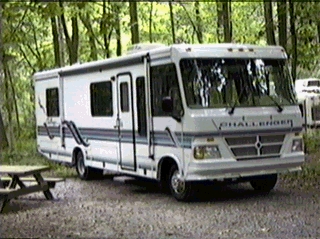Topics
Home
Buying an RV
Fulltiming
Hints & Tips
RV Lifestyle
Tech Helpers
General Interest
Destinations
Gift Ideas
RV Dictionary
RV Shows
Travel Helpers
A to Z Index
News & Notes Archive
Photo Gallery
|
Dedicated to those of us who still work for a living, RV on weekends and vacations, and dream of the day we can enjoy the RV lifestyle full time.
Fulltiming - Part 7
Meeting Your Size Requirements
Whatever your choice, you must make sure your fulltiming RV has enough size to meet your needs. Size requirements include:
- Enough storage space for all of your "stuff."
- Being small enough to park where you need to park it.
- Being within the size limits of the campgrounds you frequent.
- Having water, propane, and fuel tank capacities that meet your needs.
- Maintaining heating and cooling costs that are within your budget.
- Being reasonable to clean.
- Having sufficient interior headroom.
- Sleeping accommodations that fit.
- Weight carrying capacities that can accommodate your storage and towing needs.
When considering size, remember that the tightly spaced toilet, the just-out-of-reach cabinet, and the cramped shower space that you tolerated when you were just weekend camping may quickly become intolerable when you go fulltiming. Do not downplay the need for ample space when shopping for your fulltiming RV.
Another common debate when deciding upon the right fulltiming rig is whether to choose a motorhome with a towed vehicle or to select a trailer and a towing vehicle. Obviously, there are advantages and disadvantages to both.
 Trailers and fifth wheels offer a versatility that some motorhomes do not. The initial cost of a trailer is less than that of a motorhome. A trailer is easier to maintain and less expensive to insure. However, trailer owners must also factor in the upkeep and insurance costs of their tow vehicle. Even then, the additional storage and living space available in a trailer makes them very attractive to prospective buyers. Trailers and fifth wheels offer a versatility that some motorhomes do not. The initial cost of a trailer is less than that of a motorhome. A trailer is easier to maintain and less expensive to insure. However, trailer owners must also factor in the upkeep and insurance costs of their tow vehicle. Even then, the additional storage and living space available in a trailer makes them very attractive to prospective buyers.
Motorhomes, on the other hand, lose little versatility when paired with an auxiliary vehicle that can be used for short trips and errands. The hitching procedure for motorhomes is felt by many to be easier than that for trailers. Backing, braking, and handling are thought to be easier. Service and repairs, however, mean leaving your "home" in the hands of the repair facility while you seek temporary shelter. Motorhomes can be safer when parked in public lots or rest stops, and there's nothing like having access to snacks, drinks, and toilet facilities while driving down the highway.
Again, personal preference will be your deciding factor, especially if you already own one or the other. For a more in-depth look at the differences between the two, visit the Sometimers RV Page feature, "Toad or Towed."
Part 8 > Shopping Suggestions
|
Links
Accessibility
Buying an RV
Communications
Fulltiming
Maps & Trip Planners
Membership Campgrounds
RV Parks & Campgrounds
Personal RV Sites
Products
Publications
Renting an RV
RV Add-Ons
RV Appliances
RV Clubs
RV Manufacturers
RV Shows
Solar Power
State Tourism Information
Technical Advice
Towing Equipment
Travel Information
Travel Journals
|

